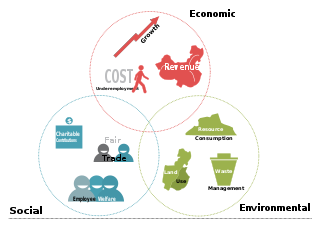
Gross domestic product (GDP) is a monetary measure of the market value of all the final goods and services produced in a specific time period. GDP (nominal) per capita does not, however, reflect differences in the cost of living and the inflation rates of the countries; therefore, using a basis of GDP per capita at purchasing power parity (PPP) may be more useful when comparing living standards between nations, while nominal GDP is more useful comparing national economies on the international market. Total GDP can also be broken down into the contribution of each industry or sector of the economy. The ratio of GDP to the total population of the region is the per capita GDP and the same is called Mean Standard of Living.

Natural capital is the world's stock of natural resources, which includes geology, soils, air, water and all living organisms. Some natural capital assets provide people with free goods and services, often called ecosystem services. All of these underpin our economy and society, and thus make human life possible.
Environmental economics is a sub-field of economics concerned with environmental issues. It has become a widely studied subject due to growing environmental concerns in the twenty-first century. Environmental economics "undertakes theoretical or empirical studies of the economic effects of national or local environmental policies around the world. ... Particular issues include the costs and benefits of alternative environmental policies to deal with air pollution, water quality, toxic substances, solid waste, and global warming."
This aims to be a complete article list of economics topics:

Ecological economics, bioeconomics, ecolonomy, eco-economics, or ecol-econ is both a transdisciplinary and an interdisciplinary field of academic research addressing the interdependence and coevolution of human economies and natural ecosystems, both intertemporally and spatially. By treating the economy as a subsystem of Earth's larger ecosystem, and by emphasizing the preservation of natural capital, the field of ecological economics is differentiated from environmental economics, which is the mainstream economic analysis of the environment. One survey of German economists found that ecological and environmental economics are different schools of economic thought, with ecological economists emphasizing strong sustainability and rejecting the proposition that physical (human-made) capital can substitute for natural capital.
An ecotax is a tax levied on activities which are considered to be harmful to the environment and is intended to promote environmentally friendly activities via economic incentives. Such a policy can complement or avert the need for regulatory approaches. Often, an ecotax policy proposal may attempt to maintain overall tax revenue by proportionately reducing other taxes ; such proposals are known as a green tax shift towards ecological taxation. Ecotaxes address the failure of free markets to consider environmental impacts.

Amory Bloch Lovins is an American writer, physicist, and chairman/chief scientist of the Rocky Mountain Institute. He has written on energy policy and related areas for four decades, and served on the National Petroleum Council, an oil industry lobbying group, from 2011 to 2018. In 1983, Lovins was awarded the Right Livelihood Award for "pioneering soft energy paths for global security". He was named by Time magazine one of the world's 100 most influential people in 2009.

Monetary reform is any movement or theory that proposes a system of supplying money and financing the economy that is different from the current system.

The triple bottom line is an accounting framework with three parts: social, environmental and financial. Some organizations have adopted the TBL framework to evaluate their performance in a broader perspective to create greater business value. Business writer John Elkington claims to have coined the phrase in 1994.
Eco-capitalism, also known as environmental capitalism or (sometimes) green capitalism, is the view that capital exists in nature as "natural capital" on which all wealth depends. Therefore, governments should use market-based policy-instruments to resolve environmental problems.

Genuine progress indicator (GPI) is a metric that has been suggested to replace, or supplement, gross domestic product (GDP). The GPI is designed to take fuller account of the well-being of a nation, only a part of which pertains to the size of the nation's economy, by incorporating environmental and social factors which are not measured by GDP. For instance, some models of GPI decrease in value when the poverty rate increases. The GPI separates the concept of societal progress from economic growth.
A green economy is an economy that aims at reducing environmental risks and ecological scarcities, and that aims for sustainable development without degrading the environment. It is closely related with ecological economics, but has a more politically applied focus. The 2011 UNEP Green Economy Report argues "that to be green, an economy must not only be efficient, but also fair. Fairness implies recognizing global and country level equity dimensions, particularly in assuring a Just Transition to an economy that is low-carbon, resource efficient, and socially inclusive."
Risk-adjusted return on capital (RAROC) is a risk-based profitability measurement framework for analysing risk-adjusted financial performance and providing a consistent view of profitability across businesses. The concept was developed by Bankers Trust and principal designer Dan Borge in the late 1970s. Note, however, that increasingly return on risk-adjusted capital (RORAC) is used as a measure, whereby the risk adjustment of Capital is based on the capital adequacy guidelines as outlined by the Basel Committee.

The System of National Accounts is an international standard system of national accounts, the first international standard being published in 1953. Handbooks have been released for the 1968 revision, the 1993 revision, and the 2008 revision. The System of National Accounts, in its various released versions, frequently with significant local adaptations, has been adopted by many nations. It continues to evolve and is maintained by the United Nations, the International Monetary Fund, the World Bank, the Organisation for Economic Co-operation and Development and the Statistical Office of the European Communities

Internal auditing is an independent, objective assurance and consulting activity designed to add value to and improve an organization's operations. It may help an organization accomplish its objectives by bringing a systematic, disciplined approach to evaluate and improve the effectiveness of risk management, control and governance processes. Internal auditing might achieve this goal by providing insight and recommendations based on analyses and assessments of data and business processes. With commitment to integrity and accountability, internal auditing provides value to governing bodies and senior management as an objective source of independent advice. Professionals called internal auditors are employed by organizations to perform the internal auditing activity.

The Central Bank of Armenia is the central bank of Armenia with its headquarters in Yerevan. The CBA is an independent institution responsible for issuing all banknotes and coins in the country, overseeing and regulating the banking sector and keeping the government's currency reserves. The CBA is also the sole owner of the Armenian Mint.

The Happy Planet Index (HPI) is an index of human well-being and environmental impact that was introduced by the New Economics Foundation in 2006. Each country's HPI value is a function of its average subjective life satisfaction, life expectancy at birth, and ecological footprint per capita. The exact function is a little more complex, but conceptually it approximates multiplying life satisfaction and life expectancy and dividing that by the ecological footprint. The index is weighted to give progressively higher scores to nations with lower ecological footprints.
Sustainability metrics and indices are measures of sustainability, and attempt to quantify beyond the generic concept. Though there are disagreements among those from different disciplines, these disciplines and international organizations have each offered measures or indicators of how to measure the concept.
The technique for human error-rate prediction (THERP) is a technique used in the field of human reliability assessment (HRA), for the purposes of evaluating the probability of a human error occurring throughout the completion of a specific task. From such analyses measures can then be taken to reduce the likelihood of errors occurring within a system and therefore lead to an improvement in the overall levels of safety. There exist three primary reasons for conducting an HRA: error identification, error quantification and error reduction. As there exist a number of techniques used for such purposes, they can be split into one of two classifications: first-generation techniques and second-generation techniques. First-generation techniques work on the basis of the simple dichotomy of ‘fits/doesn’t fit’ in matching an error situation in context with related error identification and quantification. Second generation techniques are more theory-based in their assessment and quantification of errors. ‘HRA techniques have been utilised for various applications in a range of disciplines and industries including healthcare, engineering, nuclear, transportation and business.
After the collapse of the Soviet Union in 1991 and collapse of Soviet Russia's controlled economy, a new Russian Federation was created under Boris Yeltsin in 1991. The Russian Federation had multiple economic reforms, including privatization and market and trade liberalization because of collapse of communism. The economy is much more stable than in the early 1990s, but inflation still remains an issue for Russia. Historically and currently, the Russian economy has differed sharply from major developed economies in terms of a weak legal system, underdevelopment of modern economic activities, technological backwardness, and lower living standards.










